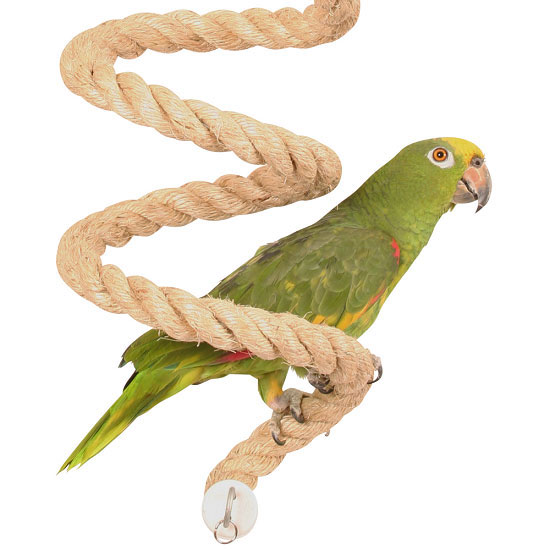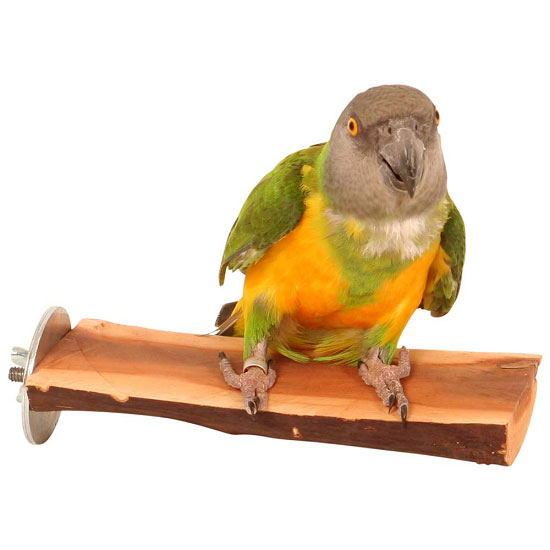Why Stock Parrot Perches?
Published on Sunday, 15th January 2017
Pet birds and Parrots need perches as they provide the most natural and comfortable surface for birds to stand, climb and well, perch on.
In the wild birds would climb and move around on tree branches and when kept as companions it’s important to help replicate this natural behaviour as much as possible.
Thankfully long gone are the days of just plain dowel wood and concrete perches. With the ever increasing developments in our understanding and knowledge of providing the best care for our animals, comes innovation.

Perches for pet birds and Parrots come in a wide range of shapes and sizes, styles and materials, and with each one some thought about how they can best benefit both the bird and their owners.
There is now a great range of perches available on the market, and catering for your bird keeping customers with a good choice of perches-with-a-purpose can really help increase sales and encourage repeat visits. In this article we’ll take a look at some of the ones you should consider stocking.
So, what types of perches are available?
Natural wood perches
Cut tree branches are popular especially those made from Coffee tree and Manzanita wood. These examples are both hardwoods, and as a result can withstand being chewed for longer compared to wood such as pine, adding perceived value, plus they look nice too.
Unlike manmade dowel, natural branches offer lots of variation in their diameter. This helps ensure that the bird’s feet are kept well exercised as they move around, where in the case of dowel wood they are kept in the same position.

Note: It is perfectly normal for hardwood perches to have splits in them which occur when the wood hardens and dries out. It is not a fault and is actually a good indicator of their hardness. Advise your customers to wedge food, treats or materials into them to promote their Parrot’s natural foraging behaviour.
Sanded perches
Sanded nail trimming perches are increasingly popular; they are made from a natural wood branch with a durable sand coating.
A Parrot’s nails and beak are always growing and it can be difficult for your customers to keep them a healthy and trim length.
Over grown nails risk becoming stuck or trapped which can cause harm to the bird. Overgrown beaks can make it difficult for birds to eat and drink properly.
The rough yet comfortable surface replicates the surface of tree bark. As birds move along the perch it wears down their nails and keeps their feet well groomed too.
Note: Birds and Parrots use rough surfaces to wipe their beak on; this helps to remove any food debris which can allow bacteria to grow. Plus, chewing on the sanded surface keep their beak trim too.
Plus for your customer and their bird it means less stress, as there’s no more wrestling matches trying to trim nails, visits to their avian vet and the associated bills.
Edible perches
These types of perches are designed be chewed and even eaten to help provide a boost in essential minerals. Ground cuttlefish bone (Edible Calcium Perch) and sea shells (Beach Branch) provide much needed calcium. Bee Pollen Perches are packed full of vitamins and minerals, as is the Manu Mineral Perch.

Note: These perches are made to be chewed up so keep them in stock and keep your customers returning back into store for replacements.
Rope perches
These are generally made from sisal or cotton and can be natural looking or coloured. The woven nature of rope perches means they too offer an uneven surface for birds to grip, working their feet as they move around.
Most have a metal wire core which the rope is plaited around, to provide added strength, plus the opportunity to bend the rope and create different shapes. Popular styles include spirals or boings, plus zigzags or steps.
Rope perches can be used in many different ways and can reach across much larger spaces then other perches.
Note: As with any product made with or using rope, including toys, it is advisable to remind your customers to check and maintain ropes regularly. Loose threads should be removed / trimmed and anything that is in a poor state should be removed and replaced.
Shower and Window Perches
These are designed to be easily and securely attached to smooth surfaces - windows tiles and mirrors are all ideal.

Parrots love bathing and having one of these perches set up in the bathroom gives Parrots a sturdy place to perch as they enjoy the mist from a shower. A good bathing routine is essential to encourage birds to groom, helping them to stay looking fantastic.
These versatile perches can be used all over the home. Set one up in your store to demonstrate how they work. Even though they can easily be moved around the home customers are inclined to buy multiple perches for their bird to use, out of convenience.
Note: Parrots love sitting on a window perch, watching the world go by, it’s much better than having them perched on top of lamps, book cases, doors and curtain rails.
Things to consider...
To help you maximise the opportunities perches can bring to increasing your profits here are a few key points to remember...
Firstly, establish what type/size of Parrot your customer has. Many perches come with a size guide showing the bird(s) they are suitable for. Familiarise yourself with this information.
In general the larger the bird, a larger average diameter of perch is needed.
A Parrot should have multiple perches of varying diameters in order to keep their feet well exercised and in superb condition. Ideally your customers should never leave your shop with just a single perch.
Just like it is a good idea to regularly change the toys in a Parrot’s cage, so too is changing the perches. This all helps to keep the bird’s cage a fresh and stimulating place to be. Encourage your customers to rotate their perches too and you, your customer and their bird can enjoy the perfect perching solution.



